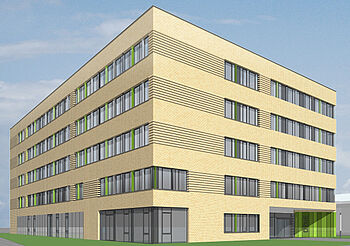Bonn/Magdeburg, February, 25th, 2014. The new research building of the German Center for Neurodegenerative Diseases in Magdeburg was inaugurated with a ceremonial opening this morning. An area of 4,400 square meters will be dedicated to the research for prevention, early diagnosis and treatment of nervous system disorders such as Alzheimer's disease. The costs of the new facility amount to about 22 million Euros, provided by the state of Saxony-Anhalt.
Minister-President Reiner Haseloff inaugurates new DZNE building in Magdeburg
“The new research building offers best conditions for scientists. This is strengthening Saxony-Anhalt as a location for science“, emphasized Minister-President Dr. Reiner Haseloff. The device infrastructure will be continually expanded in line with available budgetary resources, the head of government said. Haseloff underlined the government´s goal of developing Saxony-Anhalt to a model region for “Autonomy in old age”. Bärbel Brumme-Bothe, Director General at the Federal Ministry of Education and Research (BMBF), Magdeburg’s mayor, Dr. Lutz Trümper, University Rector Prof. Jens Strackeljan and the DZNE’s chairman of the executive board, Prof. Pierluigi Nicotera, also opened the building.
The new building will provide space for MRI-PET imaging and for training studies, as well as hosting biomedical laboratories and an area for clinical research. It is already well known that physical and mental activities improve memory function in elderly people and that such actions can delay the onset of Alzheimer’s disease. At the DZNE site Magdeburg, researchers are analyzing the neurobiological mechanisms behind this phenomenon. In doing so, several approaches are taken: In clinical studies training-based prevention therapies are being evaluated. Adaptation processes triggered in the brain are also investigated. Furthermore, DZNE scientists study how these processes can be stimulated and supported by medication.
The new building’s proximity to the neurology clinic at Magdeburg University Hospital will strengthen the translation between fundamental research and clinical application. For example, the jointly run “Preventive Research Cooperation Unit” will provide benefit to the people by the prompt integration of new scientific insights into clinical routine. In all, the new building offers ideal conditions for continuing and expanding DZNE’s internationally acclaimed research. Ongoing projects also include the further development of diagnostic imaging procedures such as magnetic resonance imaging (MRI), and the search for biological landmarks (biomarkers), which may indicate incipient dementia. These signs facilitate early diagnosis and treatment decisions.
The DZNE site Magdeburg was established in September 2009, and since then has grown quickly. Currently, about 80 scientists from ten different nations are involved in research on neurodegenerative diseases. They all cooperate closely with the Otto von Guericke University, the University Hospital Magdeburg and the Leibniz Institute for Neurobiology. The new building on the premises of the University Hospital will strengthen neuroscience research at Magdeburg and will open up new opportunities to expand existing partnerships.

